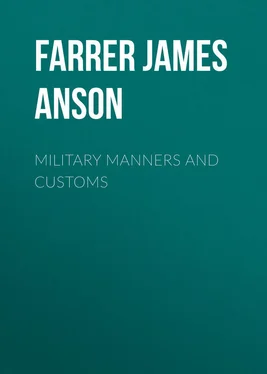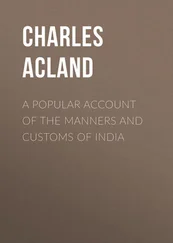James Farrer - Military Manners and Customs
Здесь есть возможность читать онлайн «James Farrer - Military Manners and Customs» — ознакомительный отрывок электронной книги совершенно бесплатно, а после прочтения отрывка купить полную версию. В некоторых случаях можно слушать аудио, скачать через торрент в формате fb2 и присутствует краткое содержание. Жанр: foreign_antique, foreign_prose, на английском языке. Описание произведения, (предисловие) а так же отзывы посетителей доступны на портале библиотеки ЛибКат.
- Название:Military Manners and Customs
- Автор:
- Жанр:
- Год:неизвестен
- ISBN:нет данных
- Рейтинг книги:5 / 5. Голосов: 1
-
Избранное:Добавить в избранное
- Отзывы:
-
Ваша оценка:
- 100
- 1
- 2
- 3
- 4
- 5
Military Manners and Customs: краткое содержание, описание и аннотация
Предлагаем к чтению аннотацию, описание, краткое содержание или предисловие (зависит от того, что написал сам автор книги «Military Manners and Customs»). Если вы не нашли необходимую информацию о книге — напишите в комментариях, мы постараемся отыскать её.
Military Manners and Customs — читать онлайн ознакомительный отрывок
Ниже представлен текст книги, разбитый по страницам. Система сохранения места последней прочитанной страницы, позволяет с удобством читать онлайн бесплатно книгу «Military Manners and Customs», без необходимости каждый раз заново искать на чём Вы остановились. Поставьте закладку, и сможете в любой момент перейти на страницу, на которой закончили чтение.
Интервал:
Закладка:
Nevertheless we must suspect that this sort of courtesy was rather occasional than habitual. Of this same Du Guesclin, whom St. – Palaye calls the flower of chivalry, 41 41 Mémoires sur la Chevalerie, i. 322.
two stories are told that throw a different but curious light on the manners of those times. Having on one occasion defeated the English and taken many of them prisoners, Du Guesclin tried to observe the rules of distributive justice in the partition of the captives, but failing of success and unable to discover to whom the prisoners really belonged, he and Clisson (who were brothers in arms) in order to terminate the differences which the victorious French had with one another on the subject, conceived that the only fair solution was to have them all massacred, and accordingly more than 500 Englishmen were put to death in cold blood outside the gates of Bressière. 42 42 Petitot, v. 102; and Ménard, Vie de B. du Guesclin, 440.
So, on a second occasion, such a quantity of English were taken that ‘there was not, down to the commonest soldier, anyone who had not some prisoner of whom he counted to win a good ransom; but as there was a dispute between the French to know to whom each prisoner belonged, Du Guesclin, to put them all on a level, ordered them to put all to the sword, and only the English chiefs were spared.’ 43 43 Petitot, v. 134.
This ferocious warrior, the product and pride of his time, and the favourite hero of French chivalry, was hideous in face and figure; and if we think of him, with his round brown face, his flat nose, his green eyes, his crisp hair, his short neck, his broad shoulders, his long arms, short body, and badly made legs, we have evidently one of the worst specimens of that type which was for so long the curse of humanity, the warrior of mediæval Europe.
In respect, therefore, of Hallam’s statement that the courtesy of chivalry gradually introduced an indulgent treatment of prisoners which was almost unknown to antiquity, it is clear that it would be unwise to press too closely the comparison on this head between pre-Christian and post-Christian warfare. At the siege of Toledo, the Besque de Vilaines, a fellow-soldier of Du Guesclin in the Spanish war, in order to intimidate the besieged into a surrender, had as many gallows erected in front of the city as he had taken prisoners, and actually had more than two dozen hung by the executioner with that object. In the pages of Livy or Thucydides there may be many a bad deed recorded, but at least there is nothing worse than the deeds of the Besque de Vilaines, or of Du Guesclin, Constable of France, or of Edward the Black Prince of England.
There is another point besides the fettering of prisoners in which attention is drawn in Froissart to the exceptional barbarity of the Spaniards; and in no estimate of the military type of life in the palmiest days of chivalry would it be reasonable to omit all consideration of Spain. In the war between Castile and Portugal, the forces under Don John of Castile laid siege to Lisbon, closely investing it; and if any Portuguese were taken prisoners in a skirmish or otherwise, their eyes were put out, their legs, arms, or other members torn off, and in such plight they were sent back to Lisbon with the message that when the town was taken mercy would be shown to none. Such was the story told by the Portuguese ambassador to the Duke of Lancaster, and repeated on his authority by Froissart. For the credit of humanity, to say nothing of chivalry, one would fain disbelieve the tale altogether, or regard it as an episode that stood by itself and apart from the general practice of the age, since it is the only one of the kind related by Froissart. But the frequency as much as the rarity of a practice may account for the silence of an annalist, and there is little doubt that mutilation of the kind described was common in the chivalrous period, even if obsolete or nearly so in the fourteenth century. Blinding and castration were not only punishments inflicted for offences against the forest laws of the Norman kings of England, but were the common fate of captive enemies in arms throughout Europe in the eleventh and twelfth centuries. This, for instance, was the treatment of their Welsh prisoners by the Earls of Shrewsbury and Chester in 1098; as also of William III., King of Sicily, at the hands of Henry, Emperor of the Romans, in 1194. At the close of the twelfth century, in the war between Richard I. of England and Philip Augustus of France, blinding was resorted to on both sides; for Hoveden expressly says: ‘The King of France had the eyes put out of many of the English king’s subjects whom he had made prisoners, and this provoked the King of England, unwilling as he was, to similar acts of impiety.’ And to take a last instance, in 1225, the Milanese having taken prisoners 500 Genoese crossbowmen, deprived each of them of an eye and an arm, in revenge for the injury done by their bows. 44 44 Meyrick, Ancient Armour, ii. 5.
So that it would be interesting, if possible, to learn from some historian the date and cause of the cessation of customs so profoundly barbarous and brutal.
By the rules, again, of chivalrous warfare all persons found within a town taken by assault were liable, and all the male adults likely, to be killed. Bertrand du Guesclin made it a maxim before attacking a place to threaten its commander with the alternative of surrender or death; a military custom perhaps as old as war itself, and one that has descended unchanged to our own times. Only by a timely surrender could the besieged cherish any hope for their lives or fortunes; and even the offer of a surrender might be refused, and an unconditional surrender be insisted upon instead. This is proved by the well-known story of Edward III. at the siege of Calais, a story sometimes called in doubt merely for resting solely on the authority of Froissart. The governor of Calais offered to surrender the town and all things in it, in return for a simple permission to leave it in safety. Sir Walter Manny replied that the king was resolved that they should surrender themselves solely to his will, to ransom or kill them as he pleased. The Frenchman retorted that they would suffer the direst extremities rather than submit to the smallest boy in Calais faring worse than the rest. The king obstinately refused to change his mind, till Sir Walter Manny, pressing upon him the reluctance of his officers to garrison his castles with the prospect of reprisals which such an exercise of his war-right would render probable, Edward so far relented as to insist on having six citizens of Calais left to the absolute disposal of his revenge. When the six who offered themselves as a sacrifice for the rest of their fellow-citizens reached the presence of the king, the latter, though all the knights around him were moved even to tears, gave instant orders to behead them. All who were present pleaded for them, and above all, Sir Walter Manny, in accordance with his promise to the French governor; but it was all in vain, and but for the entreaties of the queen, those six citizens would have fallen victims to the savage wrath of the pitiless Edward.
Two facts support the probable truth of the above narrative from Froissart. In the first place, it is in perfect keeping with the conduct of the same warrior at the taking of Caen. When the king heard what mischief the inhabitants had inflicted on his army by their vigorous defence, he gave orders that all the rest of the inhabitants should be slain and the town burnt; 45 45 i. 123.
and had it not been for the remonstrances of Sir Godfrey de Harcourt, there is little reason to doubt but that he would thus have glutted, as he craved to do, the intense native savagery of his soul. In the second place, the story is in perfect keeping with the common war-rule of that and later times, by virtue of which a conqueror might always avail himself of the distress of his enemy to insist upon a surrender at discretion, which of course was equivalent to a surrender to death or anything else.
Интервал:
Закладка:
Похожие книги на «Military Manners and Customs»
Представляем Вашему вниманию похожие книги на «Military Manners and Customs» списком для выбора. Мы отобрали схожую по названию и смыслу литературу в надежде предоставить читателям больше вариантов отыскать новые, интересные, ещё непрочитанные произведения.
Обсуждение, отзывы о книге «Military Manners and Customs» и просто собственные мнения читателей. Оставьте ваши комментарии, напишите, что Вы думаете о произведении, его смысле или главных героях. Укажите что конкретно понравилось, а что нет, и почему Вы так считаете.












